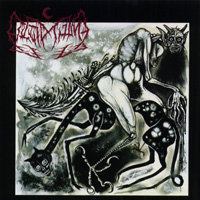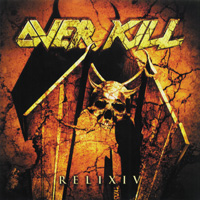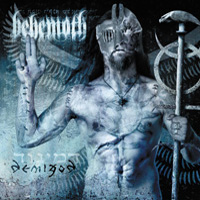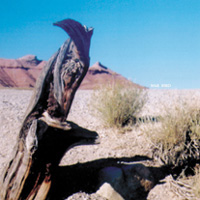 Jucifer
Jucifer
War Bird (Velocette)
An interview with singer/guitarist Amber Valentine
By Ari M. Joffe
My introduction to Amber Valentine and her soulmate Edgar Livengood came in July of 2002, when the duo opened for Melvins at The Metro in Chicago. In high spirits, me and my buds stumbled up the venue’s stairs, only to be engulfed by a voluptuous wave of distortion upon reaching the performance area.
There on stage, in front of what can only be described as a Great Wall of China-sized stack of amplifiers, stood Jucifer. We only caught the last ten minutes of their set, but it was enough to leave us with the impression that we’d witnessed something significant. They were loud (and I mean loud), and crazy, and very, very rock’n’roll. Their performance was almost disturbing in its expression of pure catharsis.
I caught up with Amber, a wildflower beauty of a woman, a few days after Halloween 2003, before a Jucifer show at Subterranean in Chicago. She was way more giddy and pleasant than anyone should be after humping the band’s notorious volume of gear up two flights of stairs. A supremely self-assured lady in her early 30s, her story is both inspiring and romantic. She and Edgar have mastered a level of dedication to their art that not many other musicians have the guts to practice.
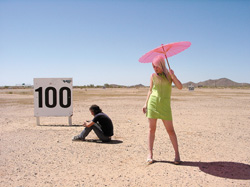 You live full-time on the road, in your touring van. What was the impetus for doing that?
You live full-time on the road, in your touring van. What was the impetus for doing that?
It was always something we really wanted to do, living on the road. We used to live next to a thrift store, and we’d get a huge stack of magazines for $1. There was an RV lifestyles magazine in this stack, and we each individually read this article about how to “break away” and move into an RV and live full-time in it. It took us a couple of weeks after we both read it to get together and talk. We were scared. If the other person didn’t want to do it, it would be an issue. As it turned out, we both really wanted to devote ourselves completely to playing music. It was a situation where we couldn’t keep a job, really, but we had to have a job. So we were barely working and not making any money. But we weren’t touring enough to pay our bills, either. It was this nebulous limbo… A lot of people thought we were crazy – a lot of people still think we’re crazy – and we’re still on the edge of total catastrophe, financially. But, we’re playing shows every night, and that’s what we want to do.
At any point, did you look at one another and say, “Oh my God! What have we done?”
Oh, yeah! It was really, really scary. Especially since we had a lot of stuff. We’d been together for nine, ten years at this point, and we were pack rats. We had this huge old house that we shared with a roommate. Then, the house got sold. Because of our touring schedule, we didn’t really have time to move out. So we had three days to cram everything that was the most precious to us into our RV and take it to our friends’ houses and our parents houses to store. We lost thousands of dollars worth of stuff that we’d bought over the years. A couple months later, we realized we were so happy that we were finally in a situation where this is all that we needed to focus on.
When you’re not touring, where do you park?
We’ve been touring the whole time! (laughs)
So it’s been like three years?
Yeah. We stop at Christmas for a week and try to see both our parents. My parents are in Georgia, and his are up in Maryland. We’re both really lucky. My dad bought some gravel and put it in the yard so we have a place to park. (laughs) Edgar’s parents live next to a big parking lot we can park in when we visit them. It’s hard to take something of this size into a neighborhood for any length of time. Campgrounds are great, but, of course, they cost money every day you’re there.
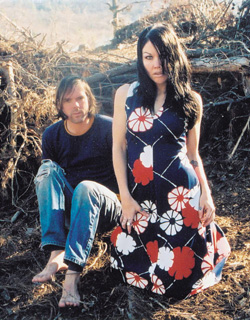 Is there anything you feel you’re missing out on by living this road-dog lifestyle?
Is there anything you feel you’re missing out on by living this road-dog lifestyle?
Our world of traveling and playing music, even though it can be stressful and tiring, is incredibly rewarding. The main thing we miss is the people we don’t get to see. You feel it a bit more when you’re a thousand miles away. Like, a friend of ours is getting married tomorrow, and we can’t be there. That’s really tough. Being out on the road all the time, you see a lot of people who aren’t doing what they want to do, and it really makes you grateful for everything you have. It puts you in touch with what’s real in life and what’s important. It takes away any pretension.
It’s pretty off the grid, the way you guys are living. But it’s kind of the way nomadic tribes, or Gypsies, lived back in the day.
Yeah. Well, I guess Gypsies did their show everywhere they went, too. Because of how I grew up, I feel really awesome when we go to towns that are kind of out of the way. Even if it’s only one person who’s like, “Oh my God! I have your record, I can’t believe you came here!” it feels really good to, like, bring the rock! (laughs)
Where did you grow up?
In rural Georgia, near the borders of Alabama and Tennessee.
How did living there affect you as you were growing up? What effect did it have on the way you’re living now and your music career?
It made me deal with being really alienated. I had very little in common with most of the people I grew up around. I went through trying to conform, and deciding it wasn’t making me happy. They were just gonna have to deal with me for who I was. Then I went through being ostracized throughout high school for being a weirdo. That gave me a whole lot of strength of character and helped me solidify my self-esteem, being based within myself. I think that has a lot to do with us as a band. We kind of had to decide at our inception, “Are we gonna be a band that tries to make people like us? Or are we gonna be a band that we like?” We’re a band that we like! (laughs)
Your music’s pretty schizophrenic. Aside from heavy rock stuff, what do you draw from?
Definitely hip-hop. Edgar grew up around Washington D.C. with all that go-go music. I grew up in the country and it was real whitebread. You didn’t hear hip-hop at all at that time. Once I moved away and got in a place where I could hear hip-hop, I loved it. I still do. It’s the only radio format music that I like. I like a lot of popular hip-hop artists. The production, the music, and the lyrics are creative and well-done, even if they’re cheesy and very stereotypical. I like bad radio hip-hop more than I like bad radio rock music. (laughs)
Where does the band fit in today’s music scene?
I don’t think we fit securely anywhere, but I definitely have a stronger affinity for the overall attitude of the stoner rock, metal, noise, and grindcore crowds. In general, I’d rather be perceived as a metal band than as an indie rock band. People are more down-to-earth about things in the metal scene. It’s a little less pretentious. Most people who gravitate towards the indie rock image are really concerned with presenting themselves as uber-cool. In general, most people who love metal are not afraid to be dorks. That’s the way it should be! That’s where happiness comes from. You don’t do things to prove how cool you are, you do things because they make you happy.
How old were you when you started playing?
My dad had guitars, and he’d played in bands when he was in college. I really didn’t want him to teach me anything. It was a pride thing. So I started sneaking around with his guitars when I was about 12 or 13. He had a nice ’60s Rickenbacker and a Fender Twin amp. I watched how he hooked it up, and when he wasn’t home, I’d hook it up. At first, I only played on one string. I immediately started recording. I had a little tape player, and I’d record my one-string punk rock songs. I had the cassette tape, and I drew the album-sized cover to go with it. (laughs)
Your first album, Calling All Cars on the Vegas Strip, came out in 1998…
It was actually recorded in 1995 and 1996. A lot of the material on it was written by us individually before we met. We put it out independently in 1998, and Capricorn picked it up and put it out in 2000. In 1999 and 2000, we recorded I Name You Destroyer. Then there was a year lag between when we finished recording and when that came out. After we were done with I Name You Destroyer, we recorded the Lambs EP because the label knew they weren’t gonna be able to put out …Destroyer for a while. So, the EP was actually recorded after …Destroyer, but it came out before.
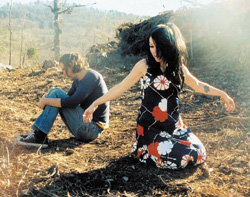 What delayed I Name You Destroyer for a year?
What delayed I Name You Destroyer for a year?
The label was Capricorn when we signed. They were in negotiations with Universal and Polygram and God only knows… I don’t know all the corporate webs that were woven. They extricated themselves from those other companies, cut their staff from 200 down to five, and turned into the indie label, Velocette. They didn’t have any distribution for about a year, so they couldn’t put a record out.
So what’s next?
We’re recording an album in February that should come out in the Fall.
Do you guys have all the material written?
Yeah. We still haven’t exhausted the stuff we wrote before we met each other. We’ve never been able to put out records at the pace that we write. So the backlog just keeps stacking up. Actually, the reason we didn’t record until last summer is because we were so fed up with recording things and not having them come out until years later. We decided that we’re not gonna record until we know for damn sure that it’s gonna come out in a fairly expedient manner.
How do you feel about the “woman in rock” thing? Do you feel any kind of obligation, as a woman, to be a kind of role model or something?
I definitely don’t want to pretend that I’m not a woman. I don’t want to be put down for wearing the color pink or wearing makeup, like somehow I’m less of a whole person. I think that’s very wrong. That’s reversed militancy. Some women will do that to you, ya know? If you’re not totally filthy, they’ll say you’re not a good role model. I don’t like the idea of being marketed as “rocker chick” or “hot chick” or anything like that. As a person – or as someone who makes music – I want the music to be taken for what it is. I don’t really like to have it related to my gender.
Are you guys doing OK? Will you be able to keep making records as things are going now?
It’s hard to predict. We’re steadily getting more fans, but the economy is so fucked up, and people are so freaked out right now, it’s not as viable an occupation as it might’ve been at other times. But it’s gonna take a hell of a lot to make us stop. Even if we don’t have a label and we don’t have any help, we’re still going to be making music. It’s part of our lives, and it’s vital to us.
(83 Walton St. Atlanta, GA 30303)

